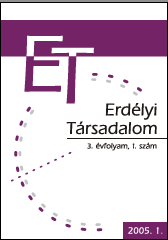Tizenévesek nemzeti identitásának jellemzői az ezredvégi Magyarországon
Characteristics of national identity among teenagers in Hungary at the end of the 20th century
Author(s): István MurányiSubject(s): Social Sciences
Published by: Presa Universitara Clujeana
Keywords: teenagers, national identity, Hungary
Summary/Abstract: The main findings of the research are: Socio-cultural factors bear only small and limited influence on the development of national identity of young people in Hungary. However, on the base of socio-cultural characteristics distinctively different types of national identity could be identified. National identity characterized by giving preference to a closed, cultural concept of a nation occurred only in an environment primarily reflecting socio-cultural consequences of cultural disadvantages. We identified a definitive structure of consistent and logical patterns in the way of thinking about the national identity in young people. No definite causation relations, but rather probability trends were identified between religious belief, religious affiliation and national identity. Rejection of freedom of selfidentification of being Hungarian, understanding a concept of a nation by employing the logic of a culture-nation concept and national emotions are characteristic features of those young people whose immediate family and wider residential environment bear adverse socio-cultural characteristics. (István Murány is a teacher of University of Debrecen, Department of Sociology; E-mail: muranyi@chello.hu.
Journal: Erdélyi Társadalom
- Issue Year: 3/2005
- Issue No: 01
- Page Range: 97-126
- Page Count: 30
- Language: Hungarian

